Unit 1 Where did you go on vacation?单元复习课件
文档属性
| 名称 | Unit 1 Where did you go on vacation?单元复习课件 |  | |
| 格式 | pptx | ||
| 文件大小 | 939.9KB | ||
| 资源类型 | 试卷 | ||
| 版本资源 | 人教新目标(Go for it)版 | ||
| 科目 | 英语 | ||
| 更新时间 | 2023-11-02 14:13:09 | ||
图片预览

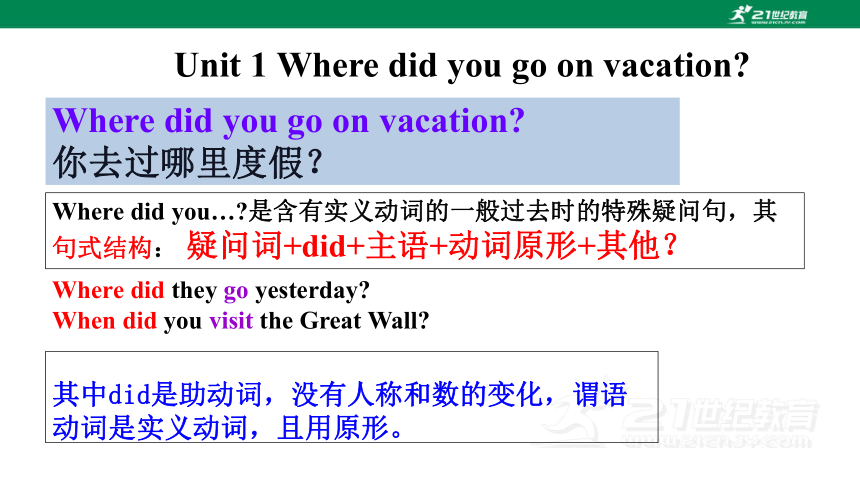
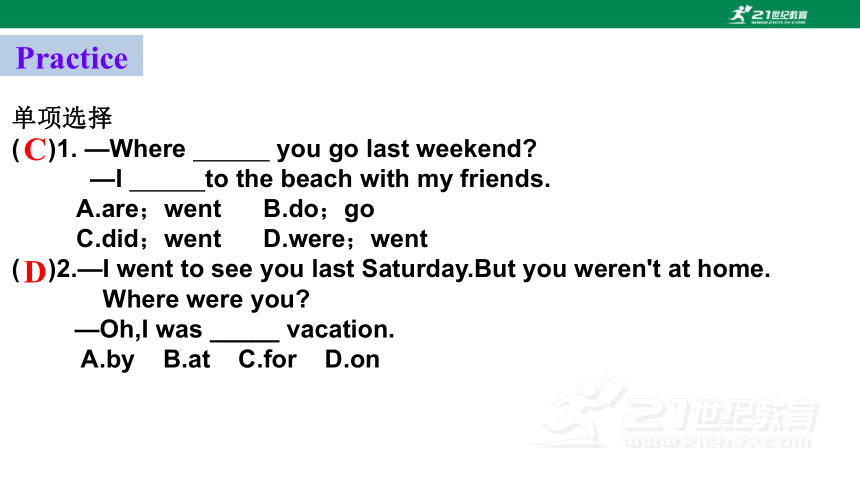
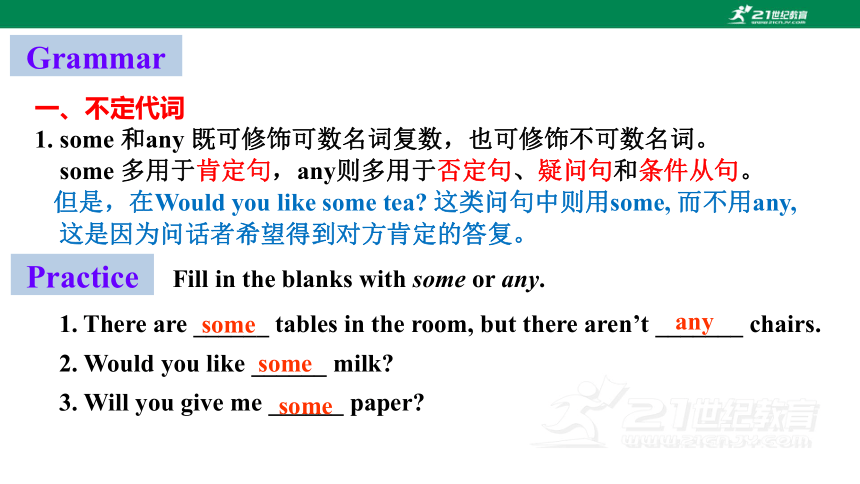
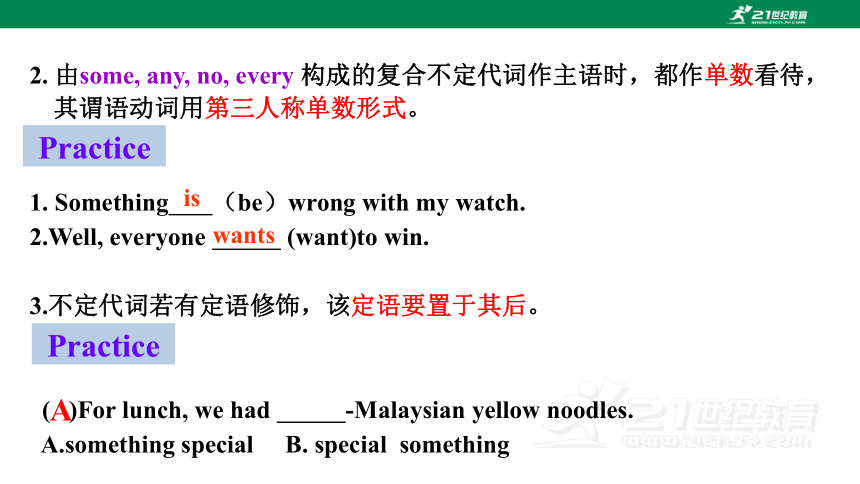
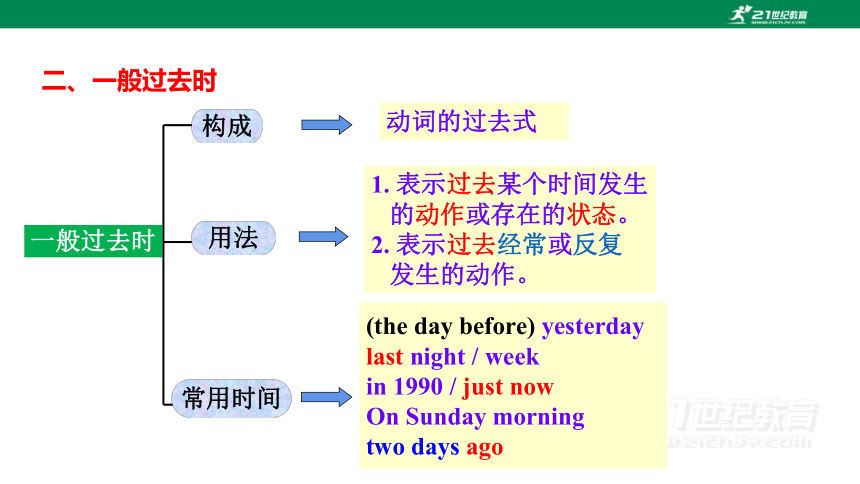
文档简介
(共12张PPT)
期中复习
Unit 1 Where did you go on vacation
人教版八年级上册
Unit 1 Where did you go on vacation
Where did you… 是含有实义动词的一般过去时的特殊疑问句,其句式结构: 疑问词+did+主语+动词原形+其他?
Where did you go on vacation
你去过哪里度假?
Where did they go yesterday
When did you visit the Great Wall
其中did是助动词,没有人称和数的变化,谓语动词是实义动词,且用原形。
Practice
单项选择
( )1. —Where you go last weekend
—I to the beach with my friends.
A.are;went B.do;go
C.did;went D.were;went
( )2.—I went to see you last Saturday.But you weren't at home.
Where were you
—Oh,I was _____ vacation.
A.by B.at C.for D.on
C
D
Grammar
一、不定代词
1. some 和any 既可修饰可数名词复数,也可修饰不可数名词。
some 多用于肯定句,any则多用于否定句、疑问句和条件从句。
但是,在Would you like some tea 这类问句中则用some, 而不用any, 这是因为问话者希望得到对方肯定的答复。
There are ______ tables in the room, but there aren’t _______ chairs.
2. Would you like ______ milk
3. Will you give me ______ paper
Fill in the blanks with some or any.
Practice
some
any
some
some
2. 由some, any, no, every 构成的复合不定代词作主语时,都作单数看待,其谓语动词用第三人称单数形式。
1. Something (be)wrong with my watch.
2.Well, everyone (want)to win.
3.不定代词若有定语修饰,该定语要置于其后。
( )For lunch, we had -Malaysian yellow noodles.
A.something special B. special something
Practice
is
wants
Practice
A
二、一般过去时
构成
用法
动词的过去式
1. 表示过去某个时间发生
的动作或存在的状态。
2. 表示过去经常或反复
发生的动作。
(the day before) yesterday
last night / week
in 1990 / just now
On Sunday morning
two days ago
一般过去时
常用时间
1. 动词be的变化:
was
were
am
is
are
2. 助动词do的变化:
do→ did (在过去时里助动词do没有人称和数的变化)
如:Did you play soccer yesterday
Did he play soccer yesterday
3. 实义动词的变化:
实义动词分规则变化和不规则变化。
规则变化有以下几种:
(1) 一般情况下在动词后加-ed。 e.g. play—played visit—visited
(2) 以不发音的e结尾的词,在词尾加-d。 e.g. note—noted like—liked
(3) 以重读闭音节结尾并且词尾只有一个辅音字母,要先双写这个辅音字母,再加-ed。
e.g. stop—stopped drop—dropped plan—planned
(4) 以辅音字母加y结尾的单词,先改y为i,再加-ed。 e.g. study—studied 不规则变化需要按一定的规律逐个记忆。
将下列词变为过去式
Practice
clean stay play
watch visit practice
study seem arrive
do have am / is
go swim buy
meet feed are
bring get sleep
cleaned stayed played
watched visited practiced
studied seemed arrived
did had was
went swam bought
met fed were
brought got slept
系动词be的过去时.
am (is) →was are →were
陈述句:He was at home yesterday.
否定句:He wasn’t at home yesterday.
疑问句:Was he at home yesterday
Yes, he was./ No, he wasn’t.
句子构成:
行为动词的一般过去时:
需要助动词did来帮忙构成否定句和疑问句。
陈述句:I went to the movie.
否定句:I didn’t go to the movie.
疑问句:Did you go to the movie
Yes, I did./ No, I didn’t.
I. 用所给词的适当形式填空,必要时添加助动词。
1. Tom and his father ________(come) to China last month.
2. My daughter ________(not go) to school yesterday.
3. There ________(be) three trees in front of this house last year.
4. ________ you ________(watch) the soccer game last Friday afternoon
5. How ________(be) the movie yesterday
6. Tony often ________(go) to the movies last year.
Practice
came
didn’t go
were
Did
watch
was
went
II. 按要求改写句子,每空一词。
1. Mary visited her aunt last weekend. (改为否定句)
Mary ________ ________ her aunt last weekend.
2. — Did you clean the room (作肯定回答)
— Yes, ________ ________.
3. I saw an interesting movie yesterday. (改为一般疑问句)
________ you ________ an interesting movie yesterday
4. They played games on the beach. (对画线部分提问)
________ ________ they ________ on the beach
5. The bus trip was exciting. (对画线部分提问)
________ ________ the bus trip
didn’t
visit
I
did
Did
see
What
did
do
How
was
谢谢
期中复习
Unit 1 Where did you go on vacation
人教版八年级上册
Unit 1 Where did you go on vacation
Where did you… 是含有实义动词的一般过去时的特殊疑问句,其句式结构: 疑问词+did+主语+动词原形+其他?
Where did you go on vacation
你去过哪里度假?
Where did they go yesterday
When did you visit the Great Wall
其中did是助动词,没有人称和数的变化,谓语动词是实义动词,且用原形。
Practice
单项选择
( )1. —Where you go last weekend
—I to the beach with my friends.
A.are;went B.do;go
C.did;went D.were;went
( )2.—I went to see you last Saturday.But you weren't at home.
Where were you
—Oh,I was _____ vacation.
A.by B.at C.for D.on
C
D
Grammar
一、不定代词
1. some 和any 既可修饰可数名词复数,也可修饰不可数名词。
some 多用于肯定句,any则多用于否定句、疑问句和条件从句。
但是,在Would you like some tea 这类问句中则用some, 而不用any, 这是因为问话者希望得到对方肯定的答复。
There are ______ tables in the room, but there aren’t _______ chairs.
2. Would you like ______ milk
3. Will you give me ______ paper
Fill in the blanks with some or any.
Practice
some
any
some
some
2. 由some, any, no, every 构成的复合不定代词作主语时,都作单数看待,其谓语动词用第三人称单数形式。
1. Something (be)wrong with my watch.
2.Well, everyone (want)to win.
3.不定代词若有定语修饰,该定语要置于其后。
( )For lunch, we had -Malaysian yellow noodles.
A.something special B. special something
Practice
is
wants
Practice
A
二、一般过去时
构成
用法
动词的过去式
1. 表示过去某个时间发生
的动作或存在的状态。
2. 表示过去经常或反复
发生的动作。
(the day before) yesterday
last night / week
in 1990 / just now
On Sunday morning
two days ago
一般过去时
常用时间
1. 动词be的变化:
was
were
am
is
are
2. 助动词do的变化:
do→ did (在过去时里助动词do没有人称和数的变化)
如:Did you play soccer yesterday
Did he play soccer yesterday
3. 实义动词的变化:
实义动词分规则变化和不规则变化。
规则变化有以下几种:
(1) 一般情况下在动词后加-ed。 e.g. play—played visit—visited
(2) 以不发音的e结尾的词,在词尾加-d。 e.g. note—noted like—liked
(3) 以重读闭音节结尾并且词尾只有一个辅音字母,要先双写这个辅音字母,再加-ed。
e.g. stop—stopped drop—dropped plan—planned
(4) 以辅音字母加y结尾的单词,先改y为i,再加-ed。 e.g. study—studied 不规则变化需要按一定的规律逐个记忆。
将下列词变为过去式
Practice
clean stay play
watch visit practice
study seem arrive
do have am / is
go swim buy
meet feed are
bring get sleep
cleaned stayed played
watched visited practiced
studied seemed arrived
did had was
went swam bought
met fed were
brought got slept
系动词be的过去时.
am (is) →was are →were
陈述句:He was at home yesterday.
否定句:He wasn’t at home yesterday.
疑问句:Was he at home yesterday
Yes, he was./ No, he wasn’t.
句子构成:
行为动词的一般过去时:
需要助动词did来帮忙构成否定句和疑问句。
陈述句:I went to the movie.
否定句:I didn’t go to the movie.
疑问句:Did you go to the movie
Yes, I did./ No, I didn’t.
I. 用所给词的适当形式填空,必要时添加助动词。
1. Tom and his father ________(come) to China last month.
2. My daughter ________(not go) to school yesterday.
3. There ________(be) three trees in front of this house last year.
4. ________ you ________(watch) the soccer game last Friday afternoon
5. How ________(be) the movie yesterday
6. Tony often ________(go) to the movies last year.
Practice
came
didn’t go
were
Did
watch
was
went
II. 按要求改写句子,每空一词。
1. Mary visited her aunt last weekend. (改为否定句)
Mary ________ ________ her aunt last weekend.
2. — Did you clean the room (作肯定回答)
— Yes, ________ ________.
3. I saw an interesting movie yesterday. (改为一般疑问句)
________ you ________ an interesting movie yesterday
4. They played games on the beach. (对画线部分提问)
________ ________ they ________ on the beach
5. The bus trip was exciting. (对画线部分提问)
________ ________ the bus trip
didn’t
visit
I
did
Did
see
What
did
do
How
was
谢谢
同课章节目录
- Unit 1 Where did you go on vacation?
- Section A
- Section B
- Unit 2 How often do you exercise?
- Section A
- Section B
- Unit 3 I'm more outgoing than my sister.
- Section A
- Section B
- Unit 4 What's the best movie theater?
- Section A
- Section B
- Unit 5 Do you want to watch a game show?
- Section A
- Section B
- Unit 6 I'm going to study computer science.
- Section A
- Section B
- Unit 7 Will people have robots?
- Section A
- Section B
- Unit 8 How do you make a banana milk shake?
- Section A
- Section B
- Unit 9 Can you come to my party?
- Section A
- Section B
- Unit 10 If you go to the party, you'll have a grea
- Section A
- Section B
